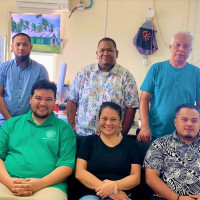The Republic of the Marshall Islands (RMI) is a coral atoll nation dispersed across nearly two million square kilometers of the Pacific Ocean comprising 1,156 islands and 29 other atolls with an average elevation of just six feet above sea level. Due to is geographic location, RMI is one of the world's most climate vulnerable countries. While RMI may contribute only a negligible 0.00001% of global greenhouse gas (GHG) emissions, the country has a proud history of prominent climate leadership on both the national and global stage.
NDC Target
Conditional (100.00%)
Unconditional (0.00%)
The Republic of Marshall Islands has an ambitious commitment to reduce greenhouse gas emissions to at least 32% below 2010 levels by 2025 and further to at least 45% below 2010 levels by 2030. These targets progress beyond RMI's Copenhagen Pledge and are based on the more rigorous data from RMI's upcoming Second National Communication.
RMI is also the only country to have committed to a gender-responsive and human rights based approach in all NDC related planning, programming and implementation.
Target Sector
Mitigation
- Electricity, transportation (land and sea), waste and cooking and lighting.
Adaptation
- RMI commits to producing a National Adaptation Plan (NAP) to support its NDC. The NAP will set out short, medium and long-term milestones to adapt to the impacts of climate change and transition to climate resilience. This National Adaptation Plan will also suggest implementation measures and a plan to generate the necessary financing.
Target Year
Activity Implementation Year
Current Activity
The NDC Hub is working in the Republic of the Marshall Islands (RMI) on a Rapid Assessment on MRV systems for RMI's Nationally Determined Contribution (NDC).

Yes, our NDCs are very ambitious. But our NDCs are a reflection of our commitment and perseverance to our climate change efforts. Through the Regional Pacific NDC Hub and other partners, it is with high hopes that we can meet our goals.
- Republic of the Marshall Islands, National Energy Office
Marshall Islands's NDC Journey
The Intended Nationally Determined Contribution for the Marshall Islands was submitted in 2015.
The Enhanced Nationally Determined Contribution for the Marshall Islands was submitted to the United Nations Framework Convention on Climate Change (UNFCCC) Secretariat at the end of 2018.
Contact details in-country team
Angeline C. Heine-Reimers
Regional Pacific NDC Hub Focal Point
Director
National Energy Office
Ministry of Environment
Benjamin Wakefield
Regional Pacific NDC Hub Alternate Point
Deputy Director
National Energy Office
Ministry of Environment
The Regional Pacific NDC Hub is funded by the Federal Ministry for Economic Cooperation and Development of Germany, the Foreign and Commonwealth Office of United Kingdom, the Department of Foreign Affairs and Trade of Australia and the Ministry of Foreign Affairs and Trade of New Zealand

